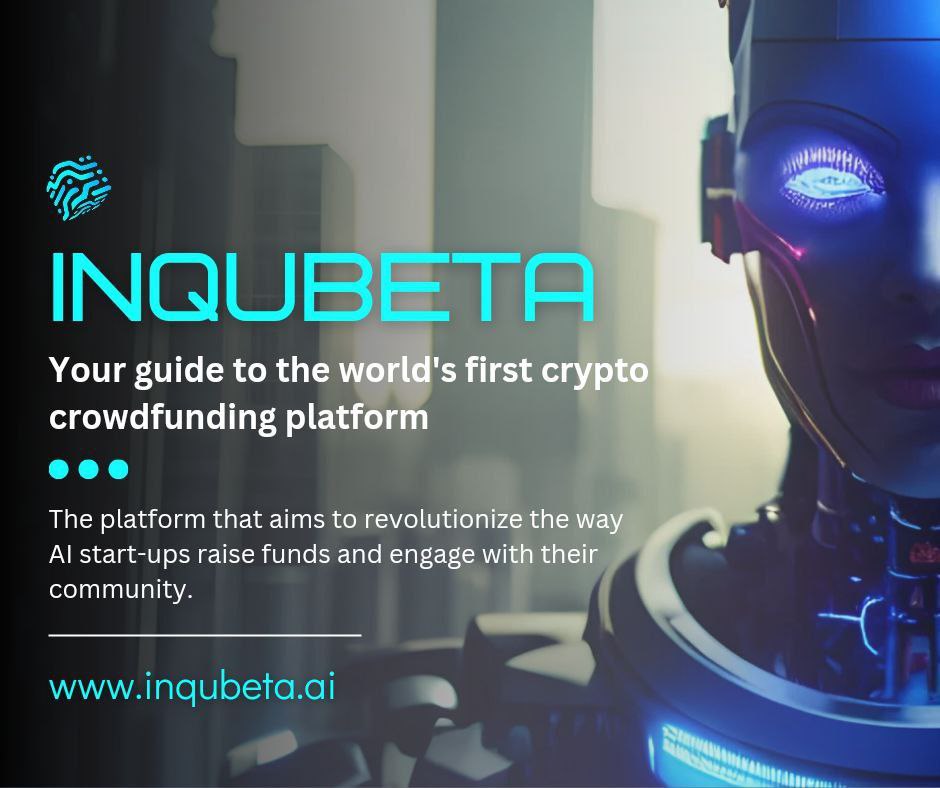The world of AI technology is rapidly advancing, promising boundless innovation and growth. At the forefront of this movement are start-up companies, driving breakthroughs in areas ranging from machine learning to robotics. However, investing in these start-ups has traditionally been an exclusive and challenging endeavor. InQubeta is changing that narrative by introducing the world’s first crypto crowdfunding platform that enables fractional investment in AI start-ups using QUBE tokens.
InQubeta’s Solution to Challenges in AI Start-up Investment
QUBE tokens are the cornerstone of InQubeta’s innovative investment ecosystem. These deflationary ERC20 tokens are a product of Inqubeta’s vision to reshape how AI start-ups raise funds and engage with their community. The uniqueness of QUBE tokens lies in their deflationary nature, with a 2% tax on buy and sell transactions contributing to a burn wallet, gradually increasing the token’s value. Moreover, a 5% sell tax feeds into a dedicated reward pool, enabling investors to earn rewards by staking their tokens. This model not only boosts the token’s worth over time but also creates an enticing investment opportunity for supporters of AI technology.
Central to InQubeta’s approach is the NFT marketplace, where AI start-ups can mint investment opportunities as NFTs and fractionalize them. This allows investors to participate with flexibility, aligning with their budget and preferences. By utilizing blockchain and smart contracts, InQubeta ensures transparency, security, and efficiency throughout the investment process.
The benefits of InQubeta’s platform extend to both start-ups and investors. AI start-ups gain access to a new funding avenue through reward and equity-based NFTs, enabling them to engage with the community and raise capital. Simultaneously, QUBE token holders can effortlessly invest in projects they believe in, creating a symbiotic ecosystem that empowers both parties.
A defining feature of QUBE tokens is their role as governance tokens, granting holders a say in platform decisions. This democratized approach invites holders to propose, discuss, and vote on platform improvements, fostering a collaborative environment where diverse perspectives shape the platform’s evolution. This unique governance mechanism ensures that InQubeta remains aligned with the needs and desires of its community.
The heart of InQubeta’s operation lies in its NFT marketplace, a game-changer for AI start-up investment. Start-ups create NFTs representing rewards and equity, offering investors a compelling value proposition. Listing these NFTs on the InQubeta marketplace allows potential investors to explore their options and invest seamlessly using QUBE tokens. As investors purchase NFTs, start-ups receive the capital needed for growth, bolstered by the support of a passionate community.
Investors, in turn, reap rewards through their NFT holdings, which may include profit-sharing, access to exclusive offerings, and other benefits tied to the start-up’s success. This symbiotic relationship nurtures the growth of AI technology start-ups while offering investors a stake in their journey.
InQubeta’s innovation lies not only in its technological prowess but also in its commitment to democratizing AI start-up investment. The platform’s combination of QUBE tokens, NFTs, and governance mechanisms creates an accessible and collaborative investment ecosystem, ushering in a new era of support for AI technology’s evolution.
As the AI landscape continues to flourish, InQubeta stands as a beacon of accessibility and inclusivity, inviting investors from all walks of life to be part of the journey. The synergy between QUBE tokens, NFTs, and governance empowers investors and start-ups alike, revolutionizing how the world engages with AI innovation. InQubeta’s vision is clear: to unite passion, innovation, and investment in a seamless and secure space, where AI technology’s potential knows no bounds.

